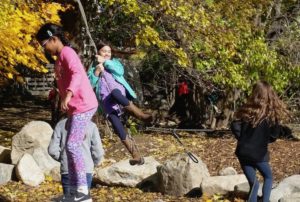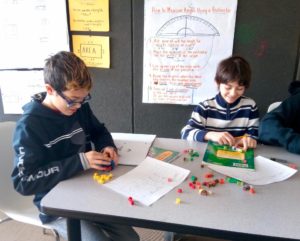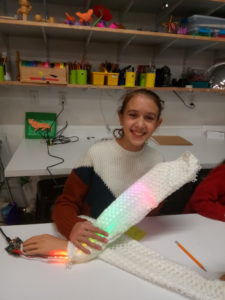By Courtney Dickinson
Kids often dread their return to school in the fall, and we – as adults – let them. Societally, we have made it a rite of passage to hate school, and we joke with students about “making it through.” We make up elaborate stories about how the resilience students will learn from buckling down and working hard on things which do not have a sense of purpose for students will, ultimately, help them become “successful.” What if what we are actually doing is just patterning them to tolerate status quo rather than act to improve things? What if we are squelching their innate creativity and force fitting their thinking into conformity rather than innovation and leadership? What if a big part of our schooling norms are actually harming children, rather than helping them? And what can we do to change it?
The evidence about how students learn, the neuroscience of brain development, and the psychology of motivation and growth all point us towards dramatically different educational practices than are currently practiced. The road is long, but we must fundamentally change our public education system.
Where do we begin? What can schools adopt right now that is immediate and – as a bonus – free?
 Re-instate recess. Schools have quashed recess, reducing it in many elementary schools to only 15 minutes a day. The rationale? There is not enough time for kids to cover the content they need to know on standardized tests. However, the tally of “learning time” does not account for learning quality. In reality, kids are unable to take on skills and knowledge being taught when they can’t focus. Recess enables kids to reset, re-focus and be more productive in their learning. Students would be better off with a little less class time and more recess, so that class time is effective.
Re-instate recess. Schools have quashed recess, reducing it in many elementary schools to only 15 minutes a day. The rationale? There is not enough time for kids to cover the content they need to know on standardized tests. However, the tally of “learning time” does not account for learning quality. In reality, kids are unable to take on skills and knowledge being taught when they can’t focus. Recess enables kids to reset, re-focus and be more productive in their learning. Students would be better off with a little less class time and more recess, so that class time is effective.
Establish school norms based upon values and trust for students rather than rules and punishments. All humans respond better when we assume that others are smart, well intentioned, and capable. School norms which focus on control – coraling kids into lines, shushing them in hallways, posting rules signs with a series of “no’s,” and consequence-based punishments which include detention and loss of recess – have been in practice for decades. However, psychology tells us that a system which effectively feels like punishment does not actually result in learning new skills or changes in behavior; it merely makes the adult feel in control, briefly. The alternative? Invite kids to walk from place to place as they’d like, without lines. If a child is inattentive or agitated in class, instead of taking recess away as punishment, give options for movement and different types of seating arrangements and accommodations which enables re-focus on learning. When we trust kids to be amazing they are amazing!
 Sort math class by ability (not age) and say goodbye to timed “math fact” tests. There are countless stories of students who have developed an identity that they are “bad at math.” Why? Could it be because of the timed math fact tests pervasive in elementary schools all over the country? Use of this outdated – and anxiety-producing – practice often makes kids think that they aren’t “good enough” simply because rapid recall tests are hard for them. Speed and intelligence are not the same thing. True mathematical fluency is about the ability to come up with lots of ways to solve problems, using a wide array of different tools. While knowing your math facts is a great skill, it can easily – and far more joyfully – be developed through games and projects which use math in ways that are applied, fun, and meaningful. This engages students to like math, and identify as strong in math. Want to improve math even further? Schedule math classes to happen at the same time, across a whole school in K-5, and free kids in middle and high school to take classes based upon readiness, not age. This can unlock new computational thinking skills and mathematical confidence across a far wider group of students.
Sort math class by ability (not age) and say goodbye to timed “math fact” tests. There are countless stories of students who have developed an identity that they are “bad at math.” Why? Could it be because of the timed math fact tests pervasive in elementary schools all over the country? Use of this outdated – and anxiety-producing – practice often makes kids think that they aren’t “good enough” simply because rapid recall tests are hard for them. Speed and intelligence are not the same thing. True mathematical fluency is about the ability to come up with lots of ways to solve problems, using a wide array of different tools. While knowing your math facts is a great skill, it can easily – and far more joyfully – be developed through games and projects which use math in ways that are applied, fun, and meaningful. This engages students to like math, and identify as strong in math. Want to improve math even further? Schedule math classes to happen at the same time, across a whole school in K-5, and free kids in middle and high school to take classes based upon readiness, not age. This can unlock new computational thinking skills and mathematical confidence across a far wider group of students.
 Add “Passion Projects” as a class option in all middle and high schools. Schools can be places of joyful learning, inquiry, and relevance. Students can connect classroom activities with real world ideas and issues by engaging in inquiry-driven projects around topics they choose and ideas they initiate, such as creating a video game which teaches about environmental needs, or initiating a service project to address a need they see at school or in the community, or creating a work of art which brings alive a story or idea they care about. Passion Projects create a runway for each student to make contributions which increase their sense of themselves as capable and valuable. The result? They want to go to school. Teachers then serve as “facilitators of discovery,” offering guidance on goal setting, research, tapping mentors and free web-based resources, and staying on track.
Add “Passion Projects” as a class option in all middle and high schools. Schools can be places of joyful learning, inquiry, and relevance. Students can connect classroom activities with real world ideas and issues by engaging in inquiry-driven projects around topics they choose and ideas they initiate, such as creating a video game which teaches about environmental needs, or initiating a service project to address a need they see at school or in the community, or creating a work of art which brings alive a story or idea they care about. Passion Projects create a runway for each student to make contributions which increase their sense of themselves as capable and valuable. The result? They want to go to school. Teachers then serve as “facilitators of discovery,” offering guidance on goal setting, research, tapping mentors and free web-based resources, and staying on track.
Decide that student happiness is a key criteria for school success, and measure it. Start tracking student satisfaction as part of school success dashboards; give students voice in what would make schools better and listen to what they have to say. Even a simple one question survey of “would you recommend your school to other students? Why/why not?” would give educators substantial new data, especially if paired with hosted discussion groups to listen and learn more from students about why they answer the way they do. If superintendents or parents state this as a priority, we can ask, listen, and then enact change based on their feedback.
Public Schools can change, and they need to change. We can’t just add amazing after school programs to fix the problems, and we can’t give up. For decades we’ve been ringing the bell for education reform. It is essential that we start today.
Courtney Dickinson founded Acera: The MA School of Science, Creativity and Leadership in 2010 as bootstrap start-up independent school, after being stymied from many attempts to launch a program within public schools. Acera is a lab school which leverages evidence based practice, and which has helped kids become the best version of themselves for a decade. AceraEI is an effort to catalyze change in public education, leveraging Acera School in Winchester as a hub of innovation.


